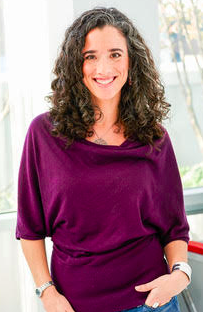Our Storytelling & Advocacy Coordinator, Jake Adler, spoke with Caron Levis, an award-winning children's book author, educator, and social worker about working through difficult topics and emotions with kids through picture books and stories.
From Levis's Ida, Always
Caron Levis, a children’s book author, educator, and social worker has become adept at delivering rich stories to her young audiences, especially stories with themes and situations that can challenge kids’ notions of life and society. Her award-winning picture book, Ida, Always, is a “beautiful, honest portrait of loss and deep friendship told through the story of two iconic polar bears” living in New York City’s Central Park.
“I think it’s important to speak super honestly to kids, and purposefully take on tougher subjects,” Levis told LitWorld. “They are sponges that hear and see and seek answers about the troubling aspects of our world like death or sadness; and without a trusted adult to explore these things with, they will fill in blanks for themselves, and the flipside of kids’ incredible creativity is that they will likely fill those blanks in with something far more scary or troubling than the truth.”
“While it comes from a natural and well intentioned impulse to protect children, adults can sometimes make the mistake of skirting around kids’ complex questions. Kids are resilient. They have better coping mechanisms than a lot of adults, but they just need a safe space to be able to communicate about their feelings openly.”
Levis’s comments gesture toward the universal, timeless power of storytelling. Songs, ballads, poems, myths, and fables have, for centuries and across cultures, paved the road for individuals and communities to share their feelings, frame intricate issues in simpler terms, and build trust, confidence, and strong, warm bonds of understanding and shared experience between people.
Levis reads her book, Stuck with the Blooz, aloud during one of her frequent classroom visits.
“That’s what is so important about picture books: they’re these safe containers in which we can have emotional experiences,” she said. “Kids are able to feel those big, scary, uncomfortable emotions, but then the book shuts, and they find themselves beside a trusted adult. Books are a place kids can practice and internalize skills that will then be there for them when they encounter similar situations in life.”
“Kids don’t get to control much, but they can have control over their books. We can give them that power: to choose when to skip a page, choose if they want to hear you say the words, or if they’d prefer to read the words themselves—or not read them at all. Books can be a loving, caring partner for kids. Books are things which tell us all that we’re going to be okay.”
“That said,” Levis continued, “I sweat over every syllable I write. I want to balance being honest and frank with being gentle and soft. I want to both challenge and take care of my readers. Stories may get uncomfortable, but they should never feel unsafe. Maybe we as authors can play a role in raising a generation who will learn to be comfortable with being uncomfortable and be more adept at having complex conversations with each other.”
“Picture books are, by their very nature, visceral experiences,” Levis explained. “Publishers know this well, and seem to be upping the ante on the book as a special object—they feel rarer in today’s world, like magic artifacts, relics of power.”
More rapidly than ever, technology is upending the status quo and changing cultures around the world. There is talk among experts that long-standing parenting paradigms like reading a bedtime story with one’s children may be threatened by iPads, Candy Crush, and YouTube. Caron Levis, however, seems largely unperturbed by the internet revolution’s potential impact on today’s kids.
“I feel like kids will always be kids,” she said, “When I give readings at schools and spend time with young children today, I see that they’re still full of the same curiosity, wonderments, big questions and feelings. These things stay the same—their desire for interaction as well as quiet and solitude. They respond to the same genuine heartfelt stories.”
The cover of Levis's Ida, Always
At the same time, Levis admits that certain aspects of the modern world must be considered when penning a story for older kids. “Certain situations just don’t ring true anymore. The stakes must be raised differently—it’s more difficult to place a fictional character, a young one, in a situation where they are truly alone. Readers might ask, ‘don’t they have a phone?’”
“It’s interesting to reflect on how phones, often given freely to young kids today, can expand their worlds and knowledge as much as they can oppress and bully them,” Levis noted. “I’m not a member of Gen X or Gen Y. I grew up analog but I was still young when I got my first Hotmail account. And yet, it feels like the technology gap between kids and myself today is as wide as it is between my grandmother and I.”
“After interactive readings on school visits, I thank kids for having helped me ‘write’ that story, because I want them to identify as writers in a big sense. As readers, their imaginations are always adding something to the story and this is a form of writing. During read alouds, the stress of spelling each word correctly falls away, and they get to be storytellers.”
“Humans are storytelling creatures, after all!” Levis exclaimed during her discussion with LitWorld. “Everything about our world—relationships, advertisements, even—is a story. Stories allow us to explore, which is exactly what kids want to do most: to interact, to engage, to be involved.”
“Kids are very happy about learning new things when it is fun,” Levis remarked, “Who isn’t?”
Caron Levis is the author of the picture books, May I Have A Word? (FSG), Stuck with the Blooz (HMH), and Ida, Always (Atheneum) which the New York Times Book Review calls, "an example of children's books at their best." Forthcoming titles include Stop That Yawn! (Atheneum, 2018); Mama's Shoes (Abrams 2019); and This Way, Charlie (Atheneum 2020.) Caron is an adjunct professor and the coordinator for The New School's Writing for Children/YA MFA program, where she earned her degree; she has an LMSW from Hunter College. After many years as an arts educator, Caron now loves using acting and writing to teach social, emotional, and literacy skills to students of all ages through her author workshops.





